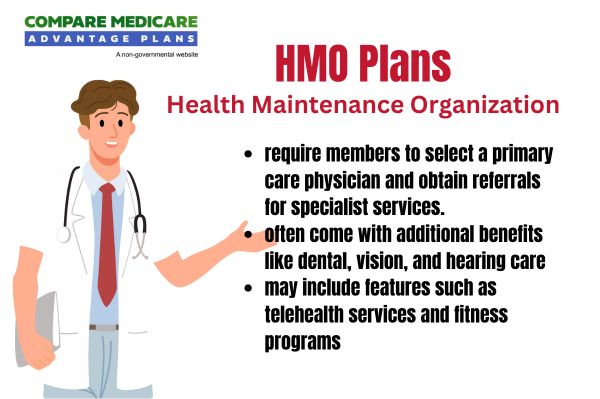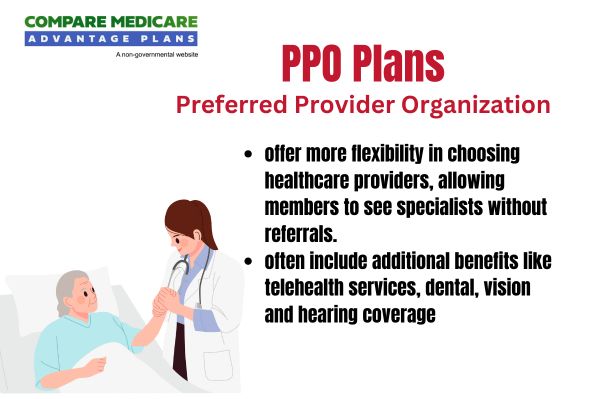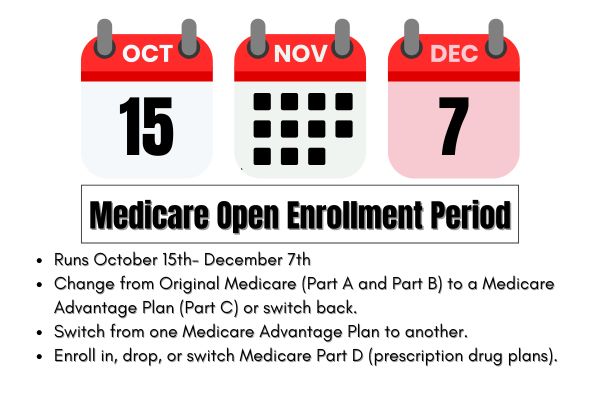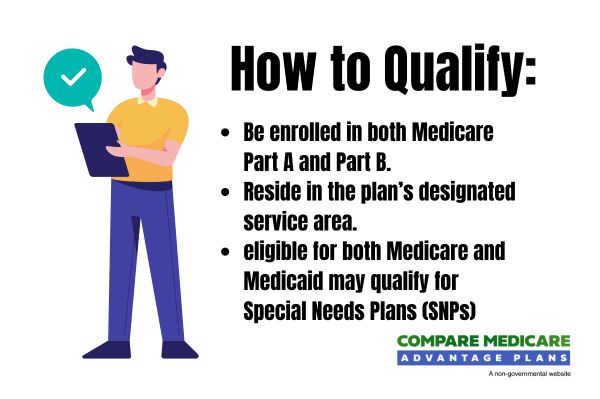Medicare Advantage Plans Kansas 2026
Medicare Advantage plans Kansas
Key Takeaways
- As of 2025, Kansas offers 92 Medicare Advantage plans, providing coverage for approximately 96.9% of Medicare beneficiaries, with an average monthly premium increase to $11.93.
- Medicare Advantage plans in Kansas include various types such as HMO, PPO, and SNPs, each offering unique features and additional benefits like dental, vision, and fitness programs.
- The Medicare Advantage enrollment period in 2025 runs from October 15 to December 7, offering beneficiaries the opportunity to switch plans or enroll, with additional options for those qualifying for Special Enrollment Periods.
Compare Plans in One Step!
Enter Zip Code
Understanding Kansas Medicare Advantage Plans 2026

Kansas offers both Original Medicare and Medicare Advantage plans, with the latter being available from private insurers. In 2025, there were 92 Medicare Advantage plans available in Kansas, reflecting an increase from 83 plans in the previous year. This rise in the number of plans ensures that nearly all Medicare beneficiaries in Kansas—approximately 96.9%—have access to these plans.
The average monthly premium for Medicare Advantage plans in Kansas rose slightly from $10.13 in 2024 to $11.93 in 2025. Despite this increase, Medicare Advantage plans remain a cost-effective option for many beneficiaries, offering extensive coverage that includes all benefits provided by Original Medicare, along with additional services.
Medicare Advantage plans provide more comprehensive care than Original Medicare. They frequently offer vision, dental, and hearing coverage, prescription drug coverage, and wellness programs to address various healthcare needs within the medicare program. Understanding the different types of plans and finding one that meets your specific requirements is crucial.
Types of Kansas Medicare Advantage Plans Available
Kansas offers several types of Medicare Advantage plans that cater to different healthcare needs, including Health Maintenance Organization (HMO) plans, Preferred Provider Organization (PPO) plans, and Special Needs Plans (SNPs).
Each of these plans has unique features and benefits designed to meet diverse healthcare requirements.
HMO Plans

HMO plans in Kansas generally require members to use a network of local providers and hospitals, except in emergencies. This network-based approach ensures that members receive coordinated care, often with lower out-of-pocket costs. However, members typically need a referral from their primary care physician to see specialists.
Aetna’s Medicare Advantage HMO plans are a prime example, requiring members to select a primary care physician who coordinates all healthcare services. These plans emphasize the use of in-network doctors and hospitals, with few out-of-network benefits available. Despite these limitations, Aetna’s HMO plans include coverage for preventive services at no extra cost, promoting proactive healthcare.
Aetna’s HMO plans in 2025 may include added benefits like dental, vision, and wellness programs, which aren’t typically covered by Original Medicare. These extra benefits make HMO plans appealing for those seeking comprehensive healthcare within a structured network.
PPO Plans

Kansas PPO plans allow members to seek care from non-network providers, usually at a higher cost, without needing referrals for specialists. This flexibility appeals to those who prefer more provider options.
Aetna’s PPO Medicare Advantage plans come with a range of benefits, including prescription drug coverage, making it easier for members to manage their medications. These plans are designed to accommodate a wide range of healthcare needs, offering various services tailored for members.
Aetna’s PPO plans may also offer dental, vision, and fitness programs, enhancing overall healthcare. Members can use out-of-network providers, though at higher costs than in-network services. This mix of flexibility and comprehensive coverage makes PPO plans popular among Kansas Medicare beneficiaries.
Special Needs Plans (SNPs)

Special Needs Plans (SNPs) in Kansas are designed for individuals with specific health needs, combining standard Medicare coverage with additional benefits tailored to these populations. These plans are tailored for individuals with specific health conditions, providing specialized services and support.
Eligibility for SNPs typically includes having a chronic illness, dual eligibility for Medicare and Medicaid, or living in a nursing home. SNPs offer coordinated care and tailor their services, provider networks, and prescription drug coverage to meet specific enrollee needs.
There are three types of SNPs: Dual Eligible SNPs for those eligible for both Medicare and Medicaid, Chronic Condition SNPs for individuals with specific chronic conditions, and Institutional SNPs for those residing in long-term care facilities. All SNPs are obligated to provide Medicare prescription drug coverage as part of their benefits.
These specialized plans ensure that enrollees receive the care and support they need, tailored to their unique health situations.
Overview of Kansas Medicare Advantage Plans 2026
Over half a million residents in Kansas are enrolled in Medicare plans, which include both Original Medicare and Medicare Advantage. Medicare Advantage plans are offered by private insurance companies and provide bundled benefits that often include additional services not covered by Original Medicare.
Plans rated 5 stars by the Centers for Medicare & Medicaid Services (CMS) indicate high-quality services and customer satisfaction among Medicare Advantage options in Kansas City. These high ratings reflect the commitment of private insurers to provide comprehensive and quality healthcare services.
Many Kansas Medicare Advantage plans include benefits like dental, vision, and wellness programs, enhancing their appeal. Some plans also offer perks like fitness memberships and transportation services, which aren’t typically available through Original Medicare. This variety makes Medicare Advantage plans popular among Kansas residents.
Covered Services and Benefits

Aetna’s Medicare Advantage plans cover various medical services, including hospital stays, outpatient care, and preventive services. They also provide dental, vision, and hearing benefits.
Aetna also offers additional benefits like over-the-counter allowances and fitness programs such as SilverSneakers. Prescription drug coverage is frequently included, making medications more accessible for members.
Aetna members can benefit from care management programs to help navigate their health needs. This comprehensive approach ensures access to a wide range of services and support, enhancing the overall healthcare experience.
Key Benefits of Kansas Medicare Advantage Plans 2026
Kansas Medicare Advantage plans provide additional benefits beyond Original Medicare, such as vision, dental, and hearing services. Nearly all Medicare beneficiaries in Kansas have access to these plans, many of which come with no monthly premiums.
As of 2025, there are 92 Medicare Advantage plans available in Kansas, an increase from 83 plans in 2024. These plans can fully replace Original Medicare, providing a single plan that encompasses various healthcare needs. This consolidation of services can simplify healthcare management for beneficiaries, making it easier to access and utilize healthcare services.
Additional Health Services
By 2025, nearly all Medicare Advantage plans will include vision, dental, or hearing benefits. However, transportation benefits will be available in only 30% of plans, down from 36% in 2024.
Special Needs Plans (SNPs) are more likely to include transportation and meal benefits than regular Medicare Advantage plans. In 2025, 84% of SNPs will offer food and produce benefits to enrollees.
Telehealth benefits have been part of the basic Medicare Advantage package since 2020, enhancing access to care, especially for those who find it difficult to travel to medical appointments.
Enrollment Process for Kansas Medicare Advantage Plans 2026
Individuals can enroll in Kansas Medicare Advantage plans during specific Medicare-designated enrollment periods. Knowing these periods and the enrollment process is crucial for accessing plan benefits.
When to Enroll

The open enrollment period for Kansas Medicare Advantage plans in 2025 runs from November 4 to November 22, 2024. Individuals should enroll in a new Aetna plan by December 31, 2024, to avoid a lapse in coverage, especially if their current plan is unavailable in 2025.
The Annual Enrollment Period for 2025 starts on October 15, 2024. Those eligible for a Special Enrollment Period can enroll online from December 8, 2024, to February 28, 2025.
The initial enrollment for a new Aetna Medicare Advantage plan starts on October 15, 2024, and runs until December 31, 2024. If affected by the termination of your current plan, you can use a Special Enrollment Period from December 8, 2024, to February 28, 2025, to select a new plan.
Different Enrollment Periods
Kansas Medicare Advantage plans have various enrollment periods, including annual open enrollment and special enrollment for qualifying events. Individuals can enroll during specific windows, such as the Initial Enrollment Period, which lasts seven months around their Medicare eligibility date.
The Open Enrollment Period for Medicare Advantage runs annually from October 15 to December 7, permitting beneficiaries to switch plans or modify coverage. Special enrollment periods are available for those experiencing significant life changes, such as moving or losing other health coverage, allowing enrollment outside usual periods.
The Medicare Advantage Open Enrollment Period, from January 1 to March 31, allows those already enrolled to switch plans or return to Original Medicare. The Initial Enrollment Period lets new beneficiaries enroll, starting three months before and ending three months after their coverage begins.
OEP, AEP, Special Enrollment
During open enrollment, beneficiaries can enroll in a new plan, switch plans, or cancel existing coverage. The Open Enrollment Period (OEP) runs from January 1 to March 31, allowing beneficiaries to switch plans or revert to Original Medicare.
The Annual Enrollment Period (AEP) occurs from October 15 to December 7, during which individuals can enroll in, switch, or cancel their Medicare plans. Special Enrollment Periods (SEPs) are available for those facing specific life changes, such as losing coverage or moving, allowing enrollment or plan changes.
The Annual Enrollment Period (AEP) for 2025 runs from October 15 to December 7, 2024, allowing beneficiaries to switch plans or enroll in a new one. Individuals can enroll in a new Medicare Advantage plan until December 31, 2024, to ensure coverage starts in January 2025.
Costs Associated with Kansas Medicare Advantage Plans 2026

Medicare Advantage plans come with various costs, including premiums, copays, and deductibles, which can vary significantly by plan. Knowing these costs is crucial for making an informed healthcare coverage decision.
Premiums and Co-Pays
In 2025, Medicare Advantage plan premiums may be lower than Original Medicare costs, offering a cost-effective option for beneficiaries. Aetna Medicare Advantage premiums can vary significantly based on plan type and coverage options.
Co-pays in Aetna’s Medicare Advantage plans vary by service, ranging from $0 for preventive services to higher amounts for specialist visits. This variability lets beneficiaries choose a plan that fits their healthcare needs and budget.
Out-of-Pocket Maximums
Medicare Advantage plans include a maximum out-of-pocket limit, ensuring beneficiaries won’t pay more than a specified amount for covered services each year. Aetna’s plans feature an annual out-of-pocket maximum to protect members from extremely high costs.
After reaching this limit, members usually pay no additional costs for covered services for the rest of the plan year.
Covered Services and Benefits
Aetna Medicare Advantage plans offer a range of medical and prescription drug coverage, enhancing members’ health and well-being. Dental benefits include coverage for checkups, cleanings, and X-rays to maintain oral health. Vision care covers annual exams and assistance for glasses or contact lenses.
Hearing coverage includes fittings for hearing aids and annual exams to keep members engaged in daily life. The over-the-counter benefit lets members purchase eligible health products, supporting overall wellness. These comprehensive benefits ensure access to necessary healthcare services, maintaining health and quality of life, including current coverage.
How to Qualify for Kansas Medicare Advantage Plans 2026

To qualify for Kansas Medicare Advantage plans, individuals must be eligible for Medicare, including those 65 or older or younger with certain disabilities. Applicants must also reside in the plan’s service area and be enrolled in both Medicare Part A and Part B.
Knowing these eligibility requirements ensures potential enrollees can access the comprehensive benefits offered by Kansas Medicare Advantage plans. Review the specific qualifications and ensure all criteria are met before applying.
Contracted Network and Access to Care
Aetna’s Medicare Advantage plans allow members to see out-of-network providers, though this may involve higher costs. Members of Aetna’s HMO plans must use network providers for non-emergency care to minimize expenses.
Aetna Medicare Advantage PPO plans don’t require primary care provider (PCP) referrals to see specialists, allowing easier access to care. Emergency and urgent care services are covered worldwide, ensuring access to necessary medical services no matter where members are.
Comparing Kansas Medicare Advantage Plans to Original Medicare
Kansas residents can choose between Original Medicare and various Medicare Advantage plans, offering different coverage options through private insurers. Nearly all Medicare enrollees in Kansas have access to these plans, allowing them to select the best coverage for their needs.
Coverage Differences
Kansas Medicare Advantage plans typically offer additional benefits beyond Original Medicare, such as vision, dental, and hearing services. These plans often include prescription drug coverage, which is separate in Original Medicare and requires a Part D plan.
Unlike Original Medicare, which operates on a fee-for-service basis, many Medicare Advantage plans may utilize managed care structures, such as Health Maintenance Organizations (HMOs) or Preferred Provider Organizations (PPOs). This means that members may have specific provider networks, limiting where they can receive care compared to the broader choices available with Original Medicare.
Cost Comparisons
The average monthly premium for Medicare Advantage plans in Kansas rose from $10.13 in 2024 to $11.93 in 2025. Some Aetna Medicare Advantage plans include added benefits such as gym memberships or wellness programs, which are typically not available with Original Medicare.
Aetna’s Medicare Advantage plans often have lower out-of-pocket costs compared to Original Medicare, especially regarding co-pays and deductibles. Monthly premiums for Aetna’s Medicare Advantage plans can be as low as $0, contrasting with the costs associated with Original Medicare. This cost-effectiveness makes Medicare Advantage plans an attractive option for many beneficiaries.
Emergencies and Referrals

Medicare Advantage plans typically cover emergency services without requiring prior authorization, ensuring patients receive timely care in urgent situations. In emergency situations, members have the right to receive immediate care, even from non-network providers.
Members should verify if their plan requires a referral to see a specialist, as this can affect access to care. Some plans allow direct access to specialists without a referral, while others may have specific requirements related to referrals and prior authorizations for certain services.
Summary
In conclusion, Kansas Medicare Advantage plans offer a comprehensive alternative to Original Medicare, with additional benefits such as vision, dental, and hearing coverage, as well as prescription drug coverage. These plans provide flexibility and cost-effective options for beneficiaries, ensuring access to a wide range of healthcare services.
By understanding the types of plans available, the benefits they offer, and the enrollment process, individuals can make informed decisions about their healthcare coverage. Whether you’re new to Medicare or considering a switch, Kansas Medicare Advantage plans
Frequently Asked Questions
→ What are the key benefits of Kansas Medicare Advantage plans?
Kansas Medicare Advantage plans provide enhanced benefits such as vision, dental, hearing coverage, and prescription drug coverage, making them a comprehensive option for those seeking more than Original Medicare. These added services can significantly improve overall health and wellness for beneficiaries.
→ When is the open enrollment period for Kansas Medicare Advantage plans in 2025?
The open enrollment period for Kansas Medicare Advantage plans in 2025 is from November 4, 2024, to November 22, 2024. Be sure to mark your calendar!
→ What types of Medicare Advantage plans are available in Kansas?
Kansas offers a variety of Medicare Advantage plans, including HMO, PPO, and Special Needs Plans (SNPs) to cater to different healthcare needs. Consider your specific requirements when choosing the right plan.
→ How do out-of-pocket maximums work in Medicare Advantage plans?
Out-of-pocket maximums in Medicare Advantage plans protect beneficiaries by capping their annual expenses for covered services, ensuring they won’t pay beyond a set limit each year. This feature helps manage healthcare costs effectively.
→ What is the average monthly premium for Medicare Advantage plans in Kansas?
The average monthly premium for Medicare Advantage plans in Kansas is projected to increase from $10.13 in 2024 to $11.93 in 2025.

ZRN Health & Financial Services, LLC, a Texas limited liability company



